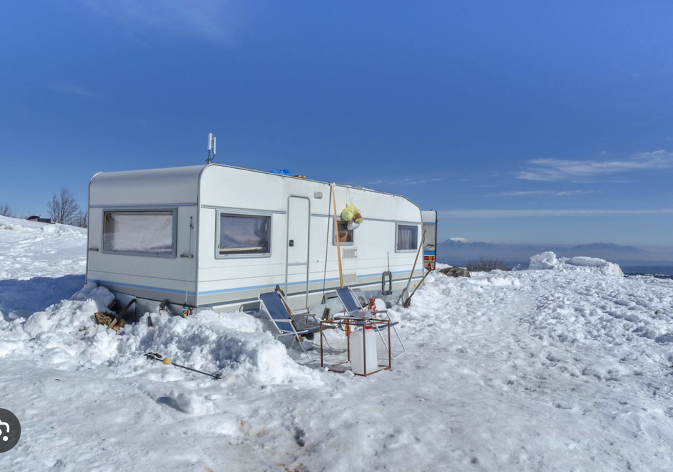
Getting your RV ready for winter can be a pain-in-the-_as. However, not nearly as bad as having your toilet not flush or all of your pipes freeze and possibly break. Here are some tips: If your RV is parked at an RV site and the sewer line is connected properly and you have a black water tank....DO NOT leave the flush valve open. Yes, leave it CLOSED and each few days (if you are using the toilet that often) open the valve for a few minutes and let the waste drain into the sewer system. WHY? Because if you leave the valve open all the time then there is a good chance the solid waste will build up in the bottom of the tank and eventually stop it up...causing a problem. Also, many times, the waste line going from an RV to the Sewer connection (for those units with a blackwater tank) is a flexible line and not perfectly sloped...if a dip is in the line and the temperature drops below freezing and stays there for days....you may not be able to use the toilet for long, (depending on how big your black water tank is). Now, if you are staying in your RV, have the heater on, and don't expect to lose power...then you should be fine. But if your RV is not going to be heated and if there is wastewater in the holding tank then you will need to use some RV & Marine type of non-toxic antifreeze and pour it down the toliet and flush it or drain the tank....and if your RV is one with a grey water tank too you will need to pour antifreeze down a sink or drain it. Same goes for the fresh water tank, if your RV is so equipped. And lastly....again if your RV is not going to be heated during periods of cold weather and the hot water heater is not going to be turned on and functioning then make sure when you drain the freshwater system and make sure the water heater (if its a tank type) drains as well!
If your RV is a park model that does not have wastewater holding tanks then you will have to leave the valve open....but it is imperative that the line running from the RV to the park's sewer system is PVC and there is a proper drop (slope) from the RV to the sewer connection. If not...it will freeze in the low spot(s) and you will not be able to use the toilet. Also, park model RV's many times have P-traps in the shower/bath tub...if really cold weather is expected, make sure you put antifreeze in the P-trap even if the heat is on. And, if its a park model and you don't plan to leave the heat on then you must put antifreeze in the P-traps in the sinks & shower, the back of the toilet and drain the water system. And don't forget to drain the waterheater if its going to be turned off.
On the subject of freshwater. One should not drip their faucets. Leave the heat on in the RV or turn the water off and drain the system. Most RV parks are on septic systems and once the lateral field is full (and likely frozen) the RV's routed to that tank will not flush, and may not for several days after the temperature rises above freezing. Even the RV Parks that are not on septic systems, many times, use transfer tanks to move the sewage to a main sewer line. Durning very cold weather the transfer lines can freeze (as many times they are not too deep underground) allowing a transfer tank that has multipule RV's feeding to overfill if the faucets are left dripping. Again, once that happens toilets won't flush and you might end up with sewer water seeping back into your RV. Another issue with dripping faucets is the freezing of P-traps. If the water is left dripping in the sink or shower and the P-trap freezes then eventually the water will be in your floor. So just DON'T leave faucets dripping.
If you want to try and keep the hose feeding freshwater to your RV from freezing,....electric pipe type and some insulation obtained at your local hardware store, works great and cost very little...the key is having a water supply hose that is close to the perfect length. Having a 50 foot hose when you only need 25 feet causes its own proplems. See More of Our other Blogs at Lakeview Marina's Website.